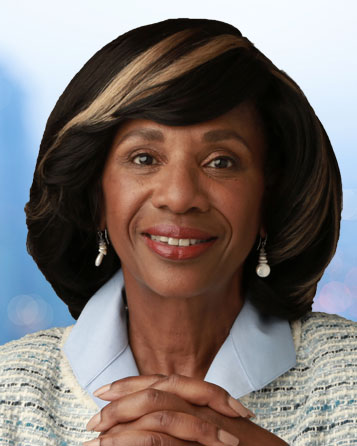In episode 7 of The Law in Black and White, Jon and Bryan kick off Women’s History Month with Paulette Brown to discuss her long career advocating for diversity, equity, and inclusion in the legal profession.
Brown discusses the barriers she has faced as a woman attorney, the strides she has made to break down those barriers, and her optimism for positive change in the legal field for women. Some highlights from her insights are provided below.
Barriers for Women in the Legal Field

Starting from Brown’s engagement with Career Services at Seton Hall, she experienced a set of challenges threatening to impede her potential for a successful career. Brown was met with gender bias at the beginning of her career as she navigated being excluded from labor negotiations in the steel industry, demanded respect as a trial lawyer in court, and dealt with a gendered and segregated profession.
Brown co-authored ABA report Visible Invisibility: Women of Color in Law Firms which found that woman make up less than 2% of equity partners. Women and specifically women of color have low retention rates at law firms. Brown says that women of color attributed their reasons for leaving to biases, lack of work, and isolation. Law firm decision makers are still overwhelmingly white men who do not perceive women of color as being capable of executing quality work or generally relate to them.
Brown emphasized that law firms are working against their own interests by not intentionally ensuring that women succeed in their firms.
Networks, Mentors, and Sponsors
Brown believes that women of color are less likely to have networks to pull from to generate business and so successful women must belong to a variety of organizations and associations from which to build networks and cultivate relationships.
“People tend to gravitate toward people who look like them” and therefore law firms and legal organizations “have to be intentional” and “think, not who have I included but who have I not included” for the ultimate success of the organization.
An Optimistic Outlook on the Future
From Brown’s upbring and her time at Howard University, she was taught certain principles about people’s fundamental right. Brown declared that you do not have to be a civil rights lawyer to “push for things that you think are just right.” After the events surrounding George Floyd last summer, Brown is hopeful for progress. She is inspired by young lawyer’s ability to push for change and equity without fear while also understanding what they need to do to be successful. She would like young people to understand that “you can do more than one thing at a time” and applauds their ability and their courage to both fight against injustice and navigate success in the law firm setting.
To hear more from Brown, the entire episode is available on our website, Spotify, Apple Podcasts and Stitcher.




